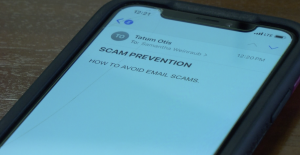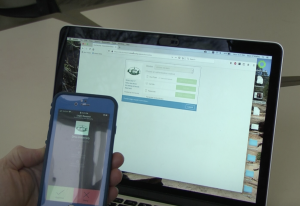
Athens Residents Hit by Email Scams
By: Tatum Otis
Posted on:
 Ohio University Police on Thursday tweeted about an increase in email scams in the Athens, Ohio area. Those tweets came after multiple reports of phishing scams.
Ohio University Police on Thursday tweeted about an increase in email scams in the Athens, Ohio area. Those tweets came after multiple reports of phishing scams.
The tweet read: “We are seeing an uptick in email scams. Emails purporting to pay hundreds of dollars a week to walk someone’s dog is a scam. So are the “sugar daddy” emails, where someone is willing to pay for online companionship. Both scams involve the suspect sending fraudulent money to the victim and then asking the victim to send some of the money back, usually in the form of gift cards.”
Phishing scams trick victims into revealing their personal information such as email passwords, bank account numbers and passwords. In most cases, scammers pretend to be someone the victim knows or someone in authority. The scammer will make the message seem urgent and will ask the receiver to provide or confirm their personal details.
Sean O’Malley, IT Communications Manager at Ohio University, said the most common scams are poorly written messages threatening to deactivate the victim’s account if they don’t take immediate action.
When the victim follows the link, a login screen that looks identical to the website will appear, tricking them into disclosing their personal information.
Phishing messages are designed to look real and often copy the exact format of a typical login page.
OUPD said in their tweet, “As a general rule, if you receive an unsolicited email from someone that wants to give you money – it is probably too good to be true. Delete it and do not communicate with them.”
Ohio University Journalism Professor Mary Rogus, was a victim of email phishing that resulted in her entire email account being shut down for nearly 24 hours, making it impossible to do her job.
“It was sent from someone I knew, the topic/subject line was one that I didn’t suspect and I just opened the email and that was enough to shut me down completely,” she said.
O’Malley has three tips to protect yourself from these scams.
 Be suspicious. If you get something that looks too good to be true, it probably is. You probably shouldn’t follow up on it or you should try to find some way to check to see if that person is a real person.
Be suspicious. If you get something that looks too good to be true, it probably is. You probably shouldn’t follow up on it or you should try to find some way to check to see if that person is a real person.- Don’t follow links that ask you to login.
- The easiest way to protect yourself even if you do get scammed, is to turn on something called “multifactorial authentication.
Multifactorial authentication is a system that requires you to use more than one method of authentication when logging in. This helps eliminate email or account hacking. For example, even if you get scammed, you will get a notification on another device that alerts you when someone is trying to login to your account.
Suspicious elements include unsolicited emails, or emails you weren’t expecting to receive, emails asking for personal or financial information, and deceptive web links. Students and employees at Ohio University can find more signs to help you determine whether the email you received was legitimate on OIT’s page.

